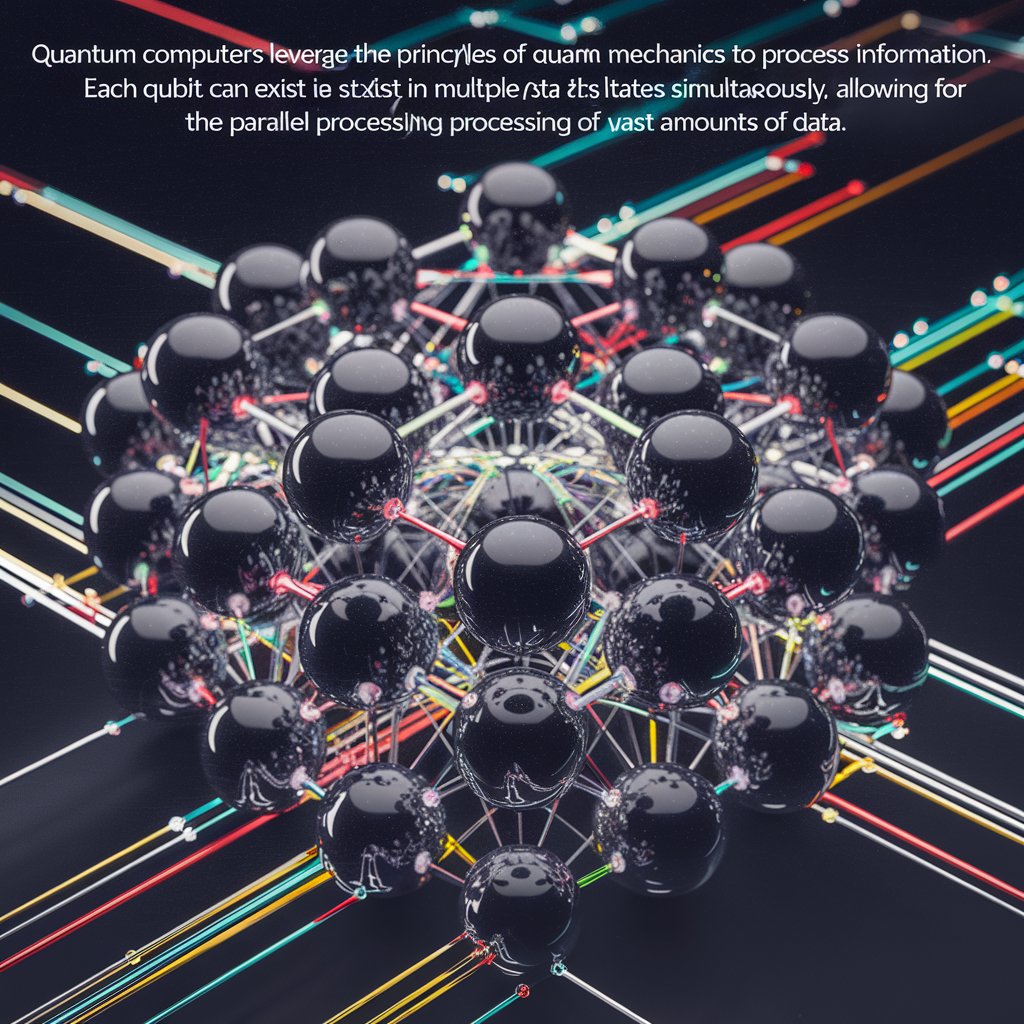What is Quantum Computing?
At its core, quantum computing is a new type of computing that leverages the principles of quantum mechanics. Classical computers use bits, which can be either 0 or 1, to perform calculations. Quantum computers, on the other hand, use qubits, which can exist in multiple states simultaneously, thanks to the properties of superposition and entanglement. This allows quantum computers to process complex calculations at speeds unattainable by classical systems.
The Science Behind Quantum Computing
Quantum computing relies on two fundamental principles of quantum mechanics: superposition and entanglement.
- Superposition allows qubits to be in a state of 0, 1, or both at the same time, unlike classical bits, which are limited to one state at a time. This exponentially increases the computational power of a quantum system.
- Entanglement is a phenomenon where qubits become connected, meaning the state of one qubit can affect the state of another, no matter how far apart they are. This interconnectedness enables more efficient problem-solving.
How Does Quantum Computing Work?
In a quantum computer, qubits are manipulated using quantum gates, similar to how classical computers use logic gates. However, these quantum gates control qubits in complex ways, allowing them to perform multiple calculations simultaneously. These calculations are executed within quantum circuits, where the qubits pass through various gates to produce results.
Quantum computers also differ in how they handle errors. Classical computers rely on error-correction codes to fix mistakes, but quantum computers must use more sophisticated methods because quantum data is highly sensitive to interference from the environment (also known as quantum decoherence).

Differences Between Classical and Quantum Computing
The primary difference between classical and quantum computing lies in how information is processed. Classical computers use binary bits (either 0 or 1) and process one task at a time, making them slower when dealing with large datasets or highly complex problems.
Quantum computers, on the other hand, can process multiple calculations at once due to superposition and entanglement. This leads to exponential improvements in speed and efficiency, especially for problems that require vast amounts of computational power, such as simulating molecular structures or optimizing supply chains.
Applications of Quantum Computing
Quantum computing has the potential to disrupt various industries:
- Drug Discovery: Quantum computers can simulate molecular interactions, making it easier and faster to discover new drugs.
- Logistics: They can optimize complex logistical challenges for industries like transportation and manufacturing.
- Climate Modeling: Quantum algorithms can process climate data much more efficiently, providing better models to predict climate change.
Quantum Computing and Cryptography
One of the most talked-about aspects of quantum computing is its potential to break current cryptographic methods. Classical encryption techniques rely on the difficulty of factoring large prime numbers, which can take classical computers years to solve. Quantum computers, however, could crack these codes in minutes using Shor’s Algorithm.
This has led to the development of quantum-resistant cryptography, which aims to secure data even in a future where quantum computers are widespread.
Quantum Computing in Healthcare
Quantum computing holds promise for revolutionizing healthcare by enabling more accurate simulations and models. For instance, quantum algorithms could significantly speed up drug discovery by simulating the interactions between different molecules. This would drastically reduce the time and cost involved in bringing new treatments to market.
Quantum Computing in Artificial Intelligence
Artificial Intelligence (AI) and quantum computing are a powerful combination. Quantum computers can process vast amounts of data, allowing for faster training of AI models and more complex machine learning tasks. As a result, we could see a new era of AI advancements, including improved natural language processing, better image recognition, and more accurate predictive models.

Challenges Facing Quantum Computing
Despite its immense potential, quantum computing faces several significant challenges:
- Hardware stability is a major issue, as qubits are highly sensitive to environmental factors. Keeping them stable enough to perform reliable computations is a difficult task.
- Scalability is another challenge, as current quantum computers have a limited number of qubits, restricting the complexity of tasks they can perform.
The Race for Quantum Supremacy
Quantum supremacy refers to the point at which quantum computers can outperform the most powerful classical computers. Major tech companies like Google, IBM, and Microsoft are in a fierce race to achieve this milestone. In 2019, Google claimed to have reached quantum supremacy by solving a problem that would take classical computers thousands of years to complete.
Quantum Computing and the Future of Work
As quantum computing becomes more mainstream, it will create new job opportunities in fields like quantum algorithm development, quantum hardware engineering, and quantum cryptography. However, it will also change the nature of work in sectors like finance, healthcare, and cybersecurity, where quantum computing could replace traditional methods with more efficient solutions.
Ethical and Security Concerns with Quantum Computing
Quantum computing’s immense power also raises ethical and security concerns. The ability to break modern encryption could pose serious threats to global security. Additionally, there are questions about who will control quantum technology and how it will be used. Governments and corporations must work together to ensure that quantum computing is developed responsibly.
When Will Quantum Computing Become Mainstream?
While the potential of quantum computing is enormous, its mainstream adoption is still years away. Some experts predict that within the next 10 to 20 years, we will see quantum computers being used regularly in certain industries. However, widespread commercial use will depend on overcoming current technical and scalability challenges.
Outline:
- Introduction
- Overview of quantum computing and its potential impact on the future of technology
- Why understanding quantum computing is important today
- What is Quantum Computing?
- Definition of quantum computing
- How it differs from classical computing
- The Science Behind Quantum Computing
- Quantum bits (qubits) explained
- Concepts of superposition and entanglement
- How Does Quantum Computing Work?
- The role of qubits in quantum computations
- Quantum gates and quantum circuits
- Differences Between Classical and Quantum Computing
- Speed and efficiency comparisons
- Data processing capabilities in quantum versus classical systems
- Applications of Quantum Computing
- Potential use cases in various industries
- Real-world examples of quantum computing in action
- Quantum Computing and Cryptography
- How quantum computing could break modern encryption methods
- The potential for quantum-resistant cryptography
- Quantum Computing in Healthcare
- AI and quantum computing in drug discovery
- Enhancing medical research with quantum algorithms
- Quantum Computing in Artificial Intelligence
- How quantum computing could revolutionize machine learning
- Impact on AI development and big data analysis
- Challenges Facing Quantum Computing
- Technical challenges in building stable quantum computers
- Scalability issues and current limitations
- The Race for Quantum Supremacy
- Major tech companies and governments in the race to achieve quantum supremacy
- What quantum supremacy means for technology and society
- Quantum Computing and the Future of Work
- How quantum computing might impact jobs in the tech sector
- The skills needed for the quantum revolution
- Ethical and Security Concerns with Quantum Computing
- Ethical implications of quantum computing’s immense power
- Security threats and global stability in a post-quantum world
- When Will Quantum Computing Become Mainstream?
- Timeline predictions for quantum computing adoption
- Factors that could accelerate or delay its mainstream use
- Conclusion
- Summary of the potential and challenges of quantum computing
- Final thoughts on its impact on the future of technology
Introduction
Quantum computing is often referred to as the next great leap in technology, poised to revolutionize industries from healthcare to cybersecurity. Unlike classical computers, which rely on bits to process information, quantum computers use qubits, unlocking possibilities far beyond what today’s systems can achieve. In this article, we’ll explore what quantum computing is, how it works, and the potential impact it could have on the future of technology.
Conclusion
Quantum computing is a groundbreaking technology with the potential to transform industries and solve problems that classical computers cannot. From revolutionizing healthcare and cryptography to powering AI advancements, the future of tech is set to be defined by quantum computing. While significant challenges remain, the race toward quantum supremacy is on, and the possibilities are limitless.

FAQs
- What makes quantum computing different from classical computing?
Quantum computing uses qubits, allowing it to process complex calculations simultaneously, whereas classical computers use bits and handle tasks one at a time. - How could quantum computing impact cryptography?
Quantum computers could break traditional encryption methods, leading to the need for quantum-resistant cryptography. - When will quantum computing become widely available?
Experts estimate that mainstream quantum computing is still 10 to 20 years away due to current technological limitations. - What industries will benefit the most from quantum computing?
Healthcare, finance, and logistics are some industries that could see the biggest impact from quantum computing. - What are the main challenges in quantum computing?
Stability, scalability, and error correction are the primary challenges facing the development of quantum computers.
